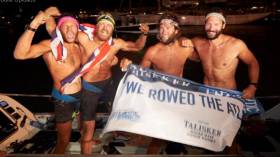Displaying items by tag: The Four Oarsmen
Four Oarsmen Win Atlantic Race in Record-Breaking Time
The first boats have finished the Atlantic Challenge ocean rowing race. The Four Oarsmen from Britain won in a record time of 29 days and 15 hours, which the organisers say is the fastest time ever for a row across the Atlantic Ocean. Team Antigua and Swiss Mocean also finished on Saturday in the race from the Canaries to Antigua in the West Indies which is sponsored by Talisker Whisky.
These three fours will be followed in by solo oarsman Mark Slats in Row4Cancer.
Two boats from Ireland are next in line. Home to Portrush is set to take fifth place, most likely arriving on Sunday. Relentless, a four drawn from Cork and Dublin, should finish on Monday or Tuesday.





























































